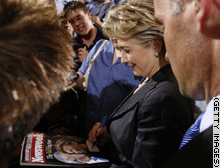|
|
Home | World | U.S. | Weather | Business | Sports | Analysis | Politics | Law | Tech | Science | Health | Entertainment | Offbeat | Travel | Education | Specials | Autos | I-Reports |
|
|
|
Home | World | U.S. | Weather | Business | Sports | Analysis | Politics | Law | Tech | Science | Health | Entertainment | Offbeat | Travel | Education | Specials | Autos | I-Reports |
|
Story Highlights• Hillary Clinton, John McCain and most others in Congress didn't read document• Newspaper: Six senators, a few House members logged as reading report • Most in Congress were briefed several times, read summary of report • Report was wrong about weapons of mass destruction in Iraq Adjust font size:
WASHINGTON (CNN) -- A new biography of Sen. Hillary Rodham Clinton has once again raised the issue of whether members of Congress read a key intelligence report before the 2002 vote to authorize war in Iraq. Clinton did not read the 90-page, classified National Intelligence Estimate on Iraq, according to "Her Way: The Hopes and Ambitions of Hillary Rodham Clinton." For members of Congress to read the report, they had to go to a secure location on Capitol Hill. The Washington Post reported in 2004 that no more than six senators and a handful of House members were logged as reading the document. The Clinton biography, written by New York Times reporters Jeff Gerth and Don Van Natta Jr., summarizes the intelligence estimate, which combined reports of U.S. intelligence agencies about Iraq. Clinton, a New York Democrat, was briefed on the intelligence report multiple times, a spokesperson told CNN. Clinton is one of six presidential candidates who were in the Senate in October 2002 who voted for the resolution to authorize the invasion of Iraq. Candidate and then-Sen. John Edwards "read and was briefed on the intelligence" while sitting on the Senate Intelligence Committee, a spokesman said. Edwards has called his vote for the 2002 resolution a mistake. Another Democratic candidate, Sen. Joseph Biden, said he read the report. A spokesman for presidential candidate Sen. Christopher Dodd said the Connecticut Democrat did not read the document, either. Republican presidential candidate Sen. John McCain of Arizona also voted in favor of the resolution without reading the report. A spokesman for McCain told CNN his boss was briefed on the document "numerous times, and read the executive summary." Other candidates were not available for comment Monday. Misleading reportThe National Intelligence Estimate concluded that the United States had "compelling evidence" that Iraq was restarting its efforts to develop a nuclear bomb and had concealed stockpiles of chemical and biological weapons from U.N. inspectors after the cease-fire that ended the 1991 Persian Gulf War. That was wrong, but that wasn't established until after a U.S. -led army toppled Iraqi dictator Saddam Hussein's government in April 2003. The intelligence report did contain passages that raised questions about the weapons conclusions, said John McLaughlin, then deputy director of the CIA. "I think if someone read the entire report, they would walk away thinking the intelligence community generally thinks he has weapons of mass destruction, but there are quite a bit of differences," he said. McLaughlin, now a CNN contributor, said dissenting views by the State Department, Department of Energy and the Air Force made up about 10 to 12 pages of the report -- but critics say those dissents were not highlighted. Biden, the chairman of the Senate Foreign Relations Committee, said he held a closed session at which members could read the report along with top CIA officials. (Watch Sen. Biden say he couldn't vote against funding the war and put troops in greater jeopardy Biden told CNN that he read the dissents in the report and he "spoke to the ones who dissented." Biden ended up voting for the resolution, but argued that he was casting a vote "to avoid a war." "It was a vote to give the authority to the president to avoid war by keeping the pressure on Saddam Hussein," the Delaware Democrat said Monday. He said Bush initially told Congress he would allow inspectors to certify whether Iraq had dismantled its weapons programs. "The president misused the power we gave him under that resolution," said Biden. Bush said war was necessary because Iraq was deceiving weapons inspectors and had demonstrated its unwillingness to disarm. A U.S.-led survey later concluded that Iraq had attempted to conceal some weapons-related research from the United Nations, but had abandoned its chemical, biological and nuclear weapons programs in the 1990s.  A new book about Hillary Clinton says she did not read a critical intelligence report before voting to authorize the war in Iraq. Other senators also did not read the report. |